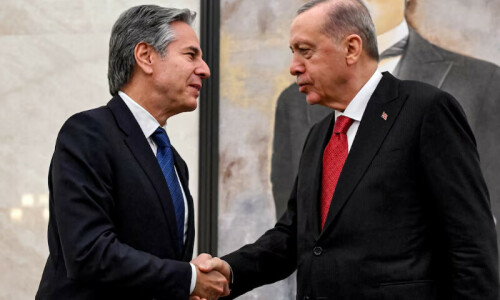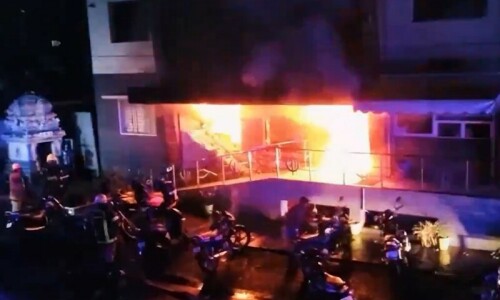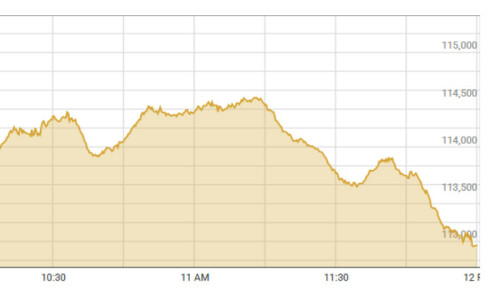NAIROBI, Jan 7: Up to 1,000 people may have died in more than a week of riots and post-election violence in Kenya, opposition leader Raila Odinga said on Monday.
Kenyan opposition leader Raila Odinga on Monday called off nationwide protests over disputed presidential elections to give mediation efforts a chance as the death toll from unrest rose above 600.
One rally had been planned for Nairobi on Tuesday, but Odinga’s decision came amid new international efforts to pressure the opposition and President Mwai Kibaki into a compromise.
Odinga said that African Union-chaired mediation could begin on Wednesday.
“We have not cancelled it (the rally), what we have done is we have postponed it because now there is a possibility of mediation talks beginning on Wednesday,” Odinga told Kenya’s Sawa Radio.
African Union chairman and Ghanaian President John Kufuor is due to arrive in Kenya on Wednesday to mediate the talks, one of his aides confirmed in Accra.
Washington’s top African envoy, Jendayi Frazer, who has been on Kenya for three days, declared on Monday that the Kenyan people had been “cheated by their political leadership and their institutions”.
Police said the toll from clashes since the Dec-27 elections had risen dramatically and a UN-backed panel said many of the deaths resembled a genocide style campaign.
“We have at least 600 dead... some bodies are still in the bushes where fighting occurred,” a top police official said. Some 250,000 people have also been displaced since the elections which the opposition says were rigged.
“Some of these killings are perpetuated in the most bizarre and cold-blooded manner, akin to ethnic cleansing and genocide, as they target the most vulnerable including women and children,” Liberata Mulamula, chief of the International Conference on the Great Lakes Region, said in a statement.
“Refugees, internal displacement, hate campaigns and threats of genocide are returning to the region,” he warned.
Odinga said he was ready to start a dialogue with Kibaki about several options including power sharing and re-elections, after meeting with Frazer, the US Assistant Secretary of State for African Affairs.
Odinga, who has called for Kibaki’s resignation, had rejected a weekend offer for a unity cabinet. Government officials, who also met with Frazer, welcomed the opposition decision to cancel their protest rallies.
“Police have concrete and specific intelligence that there are people who are going to hijack these meetings for the purpose of committing crimes,” police spokesman Eric Kiraithe told reporters earlier.
In Nairobi’s Mathare slum, scene of some of the worst unrest in recent days, some shops re-opened on Monday but tensions remained high.
“We have to work again but people are afraid here ... Nothing is back to normal here,” said Peter, a 23-year-old unemployed slum resident.
Members of Kibaki’s Kikuyu tribe gathered in small groups, fearing new attacks by opposition supporters, mainly members of Odinga’s Luo tribe.
“The Luo say Raila has won. Even the Kikuyu know that, but it’s not reason to start a war ... We want peace but we also have weapons and we are not cowards,” said 29-year-old Steve.
Poll monitors have said the vote-count was rife with irregularities with both sides trading accusations of rigging.
The electoral board declared Kibaki the winner, unleashing nationwide riots that quickly devolved into deadly tribal vendettas, notably between the Kikuyu and the Luo.
The UN estimates the chaos has displaced some 250,000 Kenyans, including 100,000 who need immediate help in the western Rift Valley region.
Aid groups warned of a health emergency in makeshift camps in schools, hospitals and churches in the isolated and still tense area.
The World Food Programme said that an escorted food convoy left Mombasa on Sunday, carrying 670 tonnes of food towards Nairobi and Eldoret.
Meanwhile police offered security to oil tankers taking fuel to neighbouring countries in a bid to end shortages in Uganda, Burundi, Rwanda and the eastern Democratic Republic of Congo.—AFP














































Dear visitor, the comments section is undergoing an overhaul and will return soon.